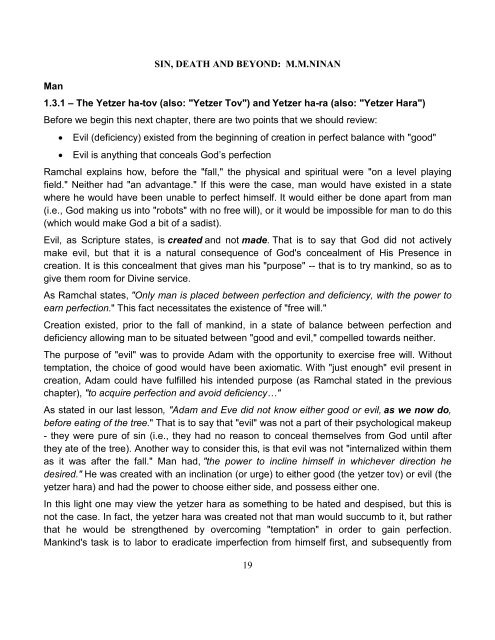Sin death and beyond
Create successful ePaper yourself
Turn your PDF publications into a flip-book with our unique Google optimized e-Paper software.
Man<br />
SIN, DEATH AND BEYOND: M.M.NINAN<br />
1.3.1 – The Yetzer ha-tov (also: "Yetzer Tov") <strong>and</strong> Yetzer ha-ra (also: "Yetzer Hara")<br />
Before we begin this next chapter, there are two points that we should review:<br />
• Evil (deficiency) existed from the beginning of creation in perfect balance with "good"<br />
• Evil is anything that conceals God’s perfection<br />
Ramchal explains how, before the "fall," the physical <strong>and</strong> spiritual were "on a level playing<br />
field." Neither had "an advantage." If this were the case, man would have existed in a state<br />
where he would have been unable to perfect himself. It would either be done apart from man<br />
(i.e., God making us into "robots" with no free will), or it would be impossible for man to do this<br />
(which would make God a bit of a sadist).<br />
Evil, as Scripture states, is created <strong>and</strong> not made. That is to say that God did not actively<br />
make evil, but that it is a natural consequence of God's concealment of His Presence in<br />
creation. It is this concealment that gives man his "purpose" -- that is to try mankind, so as to<br />
give them room for Divine service.<br />
As Ramchal states, "Only man is placed between perfection <strong>and</strong> deficiency, with the power to<br />
earn perfection." This fact necessitates the existence of "free will."<br />
Creation existed, prior to the fall of mankind, in a state of balance between perfection <strong>and</strong><br />
deficiency allowing man to be situated between "good <strong>and</strong> evil," compelled towards neither.<br />
The purpose of "evil" was to provide Adam with the opportunity to exercise free will. Without<br />
temptation, the choice of good would have been axiomatic. With "just enough" evil present in<br />
creation, Adam could have fulfilled his intended purpose (as Ramchal stated in the previous<br />
chapter), "to acquire perfection <strong>and</strong> avoid deficiency"<br />
As stated in our last lesson, "Adam <strong>and</strong> Eve did not know either good or evil, as we now do,<br />
before eating of the tree." That is to say that "evil" was not a part of their psychological makeup<br />
- they were pure of sin (i.e., they had no reason to conceal themselves from God until after<br />
they ate of the tree). Another way to consider this, is that evil was not "internalized within them<br />
as it was after the fall." Man had, "the power to incline himself in whichever direction he<br />
desired." He was created with an inclination (or urge) to either good (the yetzer tov) or evil (the<br />
yetzer hara) <strong>and</strong> had the power to choose either side, <strong>and</strong> possess either one.<br />
In this light one may view the yetzer hara as something to be hated <strong>and</strong> despised, but this is<br />
not the case. In fact, the yetzer hara was created not that man would succumb to it, but rather<br />
that he would be strengthened by overcoming "temptation" in order to gain perfection.<br />
Mankind's task is to labor to eradicate imperfection from himself first, <strong>and</strong> subsequently from<br />
19


















